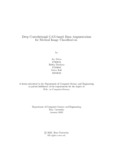Deep convolutional GAN-based data augmentation for medical image classification
Abstract
The field of medical imaging is rapidly growing with the help of machine learning, yet
the problem of scarcity in labeled medical imaging still remains. Therefore training a
machine learning model for medical image processing is always a difficult task. Data
scarcity can be solved by using data augmentation techniques which produce and
add additional data to the existing dataset. Importance of an augmented dataset
also includes increasing model prediction accuracy, adding more training data to
models, reducing data overfitting and creating variability in data, increasing generalization
ability of models, resolving class imbalance issues in classification, and
lowering data collection and labeling costs. It also helps train convolutional neural
networks for increased average accuracy. This paper focuses on solving data deficiency
in medical imaging through the use of an MRI dataset based on Alzheimer’s
affected patients. It accomplishes this by employing deep convolutional generative
adversarial networks (DCGAN) for generating realistic samples from the dataset.
Other approaches for making convincing new images from labeled original images
differ from using a deep convolutional generative adversarial network. DCGAN
learns from training samples and can generate realistic imaging data with a similar
variations, distinct from the original data. We chose to further Alzheimer’s research
because, like most neurodegenerative disorders, the clinical diagnosis of Alzheimer’s
dementia had a sensitivity of 71% to 87% and a specificity of 44% to 71%, implying
high rates of Alzheimer’s Disease misdiagnosis among patients with cognitive
impairment. Considering that alarming rate, early diagnosis of Alzheimer’s disease
necessitates the use of effective automated approaches.

